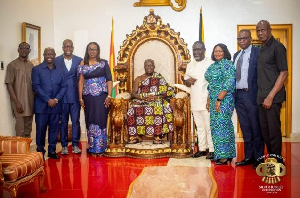- Home - News
- TWI News | TV
- Polls
- Year In Review
- News Archive
- Crime & Punishment
- Politics
- Regional
- Editorial
- Health
- Ghanaians Abroad
- Tabloid
- Africa
- Religion
- Election 2020
- Coronavirus
- News Videos | TV
- Photo Archives
- News Headlines
- Press Release
Business News of Wednesday, 9 March 2016
Source: B&FT
GSE boss serves up optimism on capital market
 Kofi Yamoah, Managing Director of GSE
Kofi Yamoah, Managing Director of GSE
Managing Director of the Ghana Stock Exchange (GSE) Kofi Yamoah is certain the stock market will strengthen its rally this year from the losses suffered in recent times, which should serve as a springboard to brighter times for the capital market.
Already optimism among investors on the Ghana Stock Exchange has begun to lift stocks as near-term fears fuelled by macroeconomic uncertainty and energy supply challenges begin to subside.
“I am very optimistic about 2016. Despite Treasury-bill rates still being high there has been some drop, but inflation is still inching up. We want the T-bill rate of fall to be much more accelerated.
“Fortunately the energy crisis is behind us, and now we are beginning to see many of the companies that struggled bouncing back into profitability and strong returns on investment and equity,” he said in an interview with the B&FT on the sidelines of Facts Behind the Figures of AFB Ghana.
The rise in optimism on the market is in spite of the fact that the GSE composite index -- which tracks the price performance of all shares listed on the stocks of the local bourse -- has so far this year declined by 1.21 percent.
Last year, the value of stocks took a 12 percent tumble, their biggest loss in more than a decade, as businesses took heavy bruises from the erratic energy supply and exchange rate losses.
In 2014 the index recorded its lowest gain in 10 years of 5.4 percent, down from the 78.8 percent recorded in 2013.
The market’s capitalisation in December 2014 stood at GH¢64.3billion, which dropped to GH¢57.1billion in December 2015. This year the value has gone up after an initial decline in the early part of the year, and currently stands at GH¢56.3billion.
Mr. Yamoah is hopes that the drop in interest rates will continue under an economic environment of continuous stability, so that listed companies will perform much better and investors will be better off.
“Naturally, a stock market will perform better in an era of low interest rates, stable exchange rates and low inflation. If we have these conditions, then we expect the market to pick up. We hope the stability will continue so we can see a better 2016 than 2015,” he added.
Since the beginning of the year, the 91-Day Treasury-bills rate has dropped from a high of 25.8 percent to 22.6 percent while inflation has slightly inched up to 19 percent and the local currency has depreciated only 2.5 percent in the first two months as against 7.6 percent within the same period last year.
But Mr. Yamoah explained that the losses in 2014 and 2015 were as a result of volatilities in the market, and rising cost of doing business, which were underpinned by a crippling energy crisis, increased taxes and a spike in utility prices.
“You cannot take those things away from what the market will do. Therefore, we could see by results of listed companies from the first three quarters of 2015 that they were struggling under these issues.
“But we expect more debt securities issuance this year on the GAX. There are others in the pipeline and so we expect that despite being an election year, companies will come to the market place, raise the income needed and do the business,” he added.
Arnold Parker, Managing Director of AFB Ghana -- one of the leading financial services companies, noted that successfully raising debt on the GSE has allowed the company to redeem all foreign denominated liabilities, thereby eliminating all foreign currency risks for the business.
The company posted a profit before tax of 100 percent, which prior to listing on the GAX would have been eroded by foreign exchange losses and constantly kept its books in the red.
“In 2015, the business paid attention to reducing its dollar debt, cutting costs and loans recovery. But listing on the GAX has opened up a bigger pool of investment funds, especially pension funds to us,” he added.
He added that despite 2016 being an election year, AFB is poised for growth and is very confident about the market in which it operates -- and hopes to serve customers better through the application of smarter technology.
“It is a matter of course that the bank is now the mobile phone. There are many more mobile money wallets than bank accounts, so the mobile money wallet will mean to us the democratisation of financial services. We are going to start serving that market aggressively and move away from brick and mortar branches.”
He added that despite the cedi stabilising in the first two months of the year, to ensure long-term stability stakeholders need to fix the economy’s fundamentals.
“We need to export more and import less; produce locally and competitively to ensure that our balance of payments and trade are right. Once we do that we are ensured of real stability. This stability is euphoric. We have to trade better and process our raw materials into finished products.”










